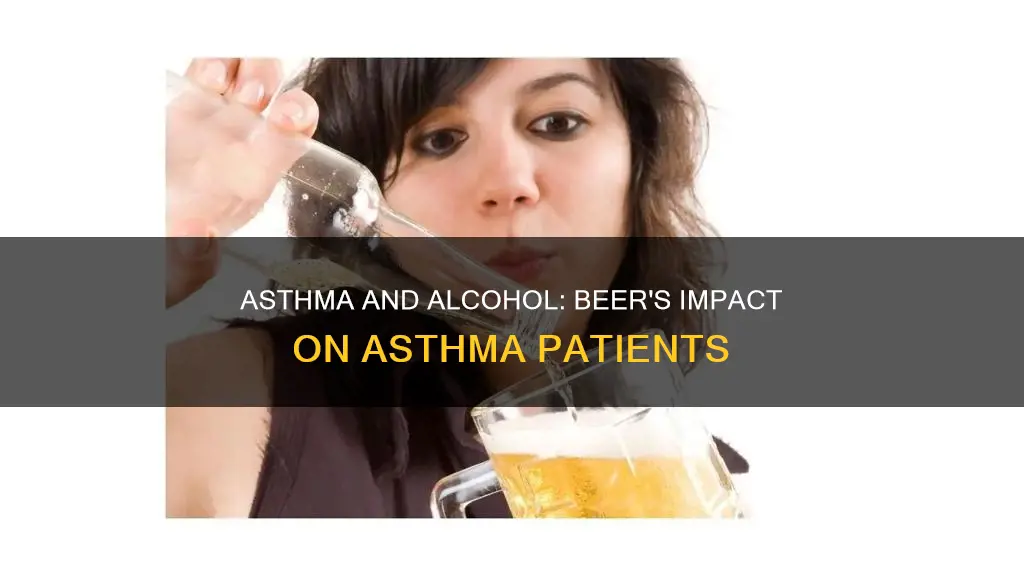
Alcohol is not usually listed as one of the important triggers for asthma, but many people with asthma have reported it as a trigger. In a 2014 survey, 18% of asthmatic participants reported alcohol as a trigger, while an older survey from 2000 found that about one-third of people self-reported experiencing an asthmatic response after drinking alcohol. Wine, beer, and whisky are the main offenders, with wine being the most common trigger. This is because wine, beer, and cider contain higher levels of sulfites and histamines, which are known to cause allergic reactions. However, there is a lack of scientific evidence of a link between alcohol and asthma, apart from one study published in 2000 in The Journal of Allergy and Clinical Immunology.
| Characteristics | Values |
|---|---|
| Can alcohol trigger an asthma attack? | Yes, 33% of participants in one study said alcohol was associated with an asthmatic event at least two times. |
| Which alcoholic drinks are most likely to trigger an asthma attack? | Wine, beer, and whisky. |
| Which substances in alcoholic drinks can trigger an asthma attack? | Histamines and sulfites. |
| What percentage of people with asthma are sensitive to sulfites? | 5-10%. |
| How soon after drinking alcohol can an asthma attack occur? | Within an hour. |
| What drinks are least likely to trigger an asthma attack? | Clear spirits such as gin and vodka contain lower levels of sulfites and histamines. |
| What should people with asthma do if they choose to drink alcohol? | Keep their reliever inhaler with them, and be aware that alcohol may slow their reaction time to asthma symptoms. |
What You'll Learn

Beer, cider, and hard alcohol can trigger asthma symptoms
Sulfites are used as preservatives in wine, beer, and cider to stop bacteria from growing. They are also naturally produced during the making of these drinks. Sulfites are known to trigger asthma symptoms or allergic reactions in some people, a sensitivity that affects up to 10% of people with asthma.
Wine, particularly red wine, is the most common trigger of asthma symptoms due to its higher levels of sulfites and histamines. However, beer, cider, and hard alcohol can still be problematic for people with asthma. Spirits such as gin and vodka contain lower levels of sulfites and histamines but may still cause issues for some people with asthma.
It is important to note that triggers can vary from person to person, and not everyone with asthma will experience issues with alcohol. However, for those who do, it is recommended to choose drinks that do not affect their asthma or opt for non-alcoholic alternatives.
Beer and Sudafed: What You Should Know
You may want to see also

Wine is the most common alcohol to trigger asthma
Wine is the most common alcoholic drink to trigger asthma symptoms. This is due to the presence of sulphites and histamines, which are produced naturally during the fermentation process. Sulphites are also added to wine to stop bacteria from growing.
Sulphites are preservatives that manufacturers commonly use when making wine, but they can be naturally found in other consumables, too. People with asthma are often sensitive to the effects of sulphites. Histamines are released in the body when you have an allergic reaction, and they can also be found in many alcoholic drinks.
In a 2000 survey, 33% of participants said that alcohol was associated with an asthmatic event at least twice. Wine was the number one culprit for inducing symptoms, with red wine being the most common inducer.
One glass of wine or beer may not affect asthma, but drinking larger amounts can cause a reaction. The amount of alcohol consumed may contribute to worsening asthma symptoms.
If you have asthma and find that alcohol triggers your symptoms, you may want to keep your alcoholic beverage intake low or avoid it altogether.
Cialis and Beer: A Safe Mix?
You may want to see also

Sulfites and histamines in alcohol can trigger asthma
Alcoholic drinks may trigger asthma symptoms in some people. According to a 2000 study published in The Journal of Allergy and Clinical Immunology, 33% of participants reported that alcohol had triggered an asthma attack on at least two occasions. The researchers identified sulfites and histamines as two components of alcoholic beverages that could potentially be allergenic and contribute to an asthma attack.
Sulfites in Alcohol
Sulfites are preservatives commonly used in wine and beer production to prevent further fermentation and maintain freshness. While generally well-tolerated, they can trigger allergic reactions in people with sensitivities or respiratory issues such as asthma. Red wine, in particular, is known for its high sulfite content. For those with sulfite sensitivity, consuming alcoholic beverages with high sulfite concentrations can lead to coughing and difficulty breathing, resembling an asthma attack.
Histamines in Alcohol
Histamines are naturally occurring chemicals produced by the body's immune system and are also found in certain foods and drinks, including alcoholic beverages. Fermentation and aging processes in winemaking contribute to higher histamine levels, with red wine containing significantly more histamine than white wine. Histamine intolerance can lead to symptoms similar to an allergic reaction, such as sneezing, hives, headaches, nausea, and digestive issues. Additionally, alcohol can inhibit the enzyme DAO, which is responsible for breaking down histamines, further contributing to histamine intolerance.
Managing Alcohol Consumption with Asthma
If you have asthma and find that alcohol triggers your symptoms, it is advisable to keep your alcoholic beverage intake low or avoid it altogether. Organic wines that do not contain added preservatives may be a better option for those sensitive to sulfites. Additionally, dry whites like Sauvignon Blanc and sparkling wines like Cava or Prosecco tend to have lower histamine levels than red wines.
The Magical Math of 79 Beers: Age Subtraction Mystery
You may want to see also

Alcohol can worsen feelings of stress and negatively impact health
Alcohol can worsen feelings of stress and negatively impact your health. While there is little scientific evidence of a link between alcohol and asthma, a study published in The Journal of Allergy and Clinical Immunology in 2000 found that 33% of people experienced an asthma attack on at least two occasions due to alcohol. Another study from 2000 reported that about one-third of people self-reported experiencing an asthmatic response after drinking alcohol.
The same study also found that 40% of those who reported asthma symptoms had mild to moderate symptoms. Wine was the most common drink that induced symptoms, particularly red wine, due to its higher levels of sulfites and histamines. Sulfites are preservatives that manufacturers commonly use when making wine and beer, but they can also be present in other consumables. People with asthma are often especially sensitive to the effects of sulfites.
Histamines are also present in all alcohol types, including liquor, beer, and wine. They are produced from bacteria and yeast when alcohol ferments. Histamines are known to cause allergic reactions, and when an allergic reaction occurs, the body produces histamine.
While the link between alcohol and asthma is not yet fully understood, it is clear that alcohol can worsen feelings of stress and negatively impact overall health. For people with asthma, this could mean an increased risk of experiencing asthma symptoms or an asthma attack.
If you have asthma and find that alcohol triggers your symptoms, it is recommended that you keep your alcoholic beverage intake low or avoid it altogether.
Beer Breakdown: Understanding Its Effect on the Human Body
You may want to see also

Alcohol can dehydrate you, causing mucus to thicken
Alcohol is a diuretic, which means it can cause dehydration. Dehydration can cause mucus to thicken, which is not helpful for asthma patients.
When the body is dehydrated, it doesn't have enough water content to function properly. This can lead to a range of issues, including thickened mucus. Mucus is a sticky substance produced by the body's mucous membranes, which line the respiratory tract, digestive tract, and other areas of the body. It helps to trap and remove foreign particles, such as dust and germs, and it also helps to keep these areas moist and lubricated.
However, when the body is dehydrated, the mucus can become thicker and more difficult to clear. For people with asthma, this can be particularly problematic. Asthma is a condition that causes the airways to become narrower, making it harder to breathe. Thickened mucus can further narrow the airways, leading to increased breathing difficulties. In some cases, it may even trigger an asthma attack.
Therefore, it is important for people with asthma to stay well-hydrated and avoid excessive alcohol consumption. Dehydration can worsen asthma symptoms and make it more difficult to manage the condition.
In addition to dehydration, alcohol can also trigger asthma symptoms due to the presence of histamines and sulfites, which are common allergens for people with asthma. Wine, in particular, has been found to be the most common trigger, with red wine being the most likely to induce symptoms due to its higher levels of sulfites and histamines. However, beer, cider, and other alcoholic beverages can also contain these substances and trigger asthma symptoms.
The effects of alcohol on asthma can vary from person to person. While some people with asthma may find that alcohol worsens their symptoms, others may not experience any issues. It is important for individuals with asthma to be aware of their triggers and take steps to avoid them. Keeping an asthma journal can be helpful in identifying triggers and managing the condition effectively.
Wine, Beer, and Mixing Drinks: What's the Verdict?
You may want to see also
Frequently asked questions
Beer contains histamines and sulfites, which can trigger asthma symptoms. Some people with asthma are sensitive to these substances, and they may experience symptoms such as a tight chest, breathlessness, or wheezing after drinking beer. However, the effect of alcohol on asthma varies from person to person, and some people with asthma may find that they can drink beer without any issues. It is important for individuals with asthma to be aware of their triggers and monitor their symptoms when drinking any type of alcohol, including beer.
Drinking beer can trigger asthma symptoms such as coughing, wheezing, and difficulty breathing. In some cases, it may even lead to a full-blown asthma attack. Additionally, alcohol can dehydrate the body, causing mucus to thicken, which can further exacerbate asthma symptoms.
Clear spirits such as gin and vodka contain lower levels of sulfites and histamines, but they may still contain traces of these substances. Organic wines that do not contain added sulfites or are sulfate-free may also be an option for some people with asthma. However, it is important to note that triggers can change, and a drink that did not previously cause symptoms may start to trigger them.
If an asthma patient experiences symptoms after drinking beer, they should follow the steps in their asthma action plan. This may include using their reliever inhaler to manage their symptoms. It is important to always carry a reliever inhaler when drinking alcohol to deal with asthma symptoms quickly if they occur.







